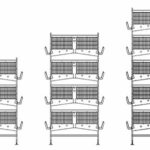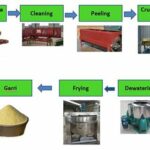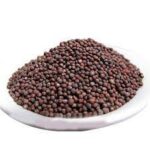3rd All Africa Horticultural Congress
7 – 12 August 2016. This Congress was hosted by the Nigerian Society for Horticultural Sciences and took place under the aegis of the International Society for Horticultural Science (ISHS).
The third AAHC follows the first and second held earlier in Kenya and South Africa, respectively. It is designed to cater to the diverse needs of the science, industry/business and capacity building sectors of the horticulture industry. There’s something for you during this congress whether you are a hobby horticulturist or a professional, so you cannot afford to miss it. Students are welcome too. It will feature symposia, an exhibition, field trips, brokerage of new business partnerships, a photo competition, and social events; all carefully put together to express the various perspectives of the theme ‘Horticulture for improved livelihoods’.
PAEPARD made a presentation related to the Importance of partnership platforms to meet the needs of horticultural enterprises: Lessons learned from international to national scales.
PROPAC attended the Side Event 3 organised by FAO on Urban Horticulture (see also below: related PAEPARD blog post)
Senegal will be hosting the 4th ALL AFRICA HORTICULTURE CONGRESS – 2020
Related PAEPARD blogpost:
February 18, 2013FIRST STATUS REPORT ON URBAN AND PERI-URBAN HORTICULTURE IN AFRICA.
© FAO 2012, 116 pages.
This report draws the attention of policymakers to urban and peri-urban horticulture, and how it can help to grow greener cities in Africa. Production of fruit and vegetables in and around urban areas has a clear comparative advantage over rural and other sources in supplying urban residents with fresh, nutritious – but highly perishable – produce all year round. It generates local employment, reduces food transport costs and pollution, creates urban green belts, and recycles urban waste as a productive resource.
Related:
The Horticulture Innovation Lab is offering a grant up to $750,000 over three years to support a research project in integrated animal-horticulture systems. Sept. 19 is the deadline for brief concept notes, submitted by U.S. university researchers. Read the whole article about this
The research should be focused on the needs of smallholder farmers in developing countries that are part of Feed the Future, with priority given to Cambodia, Nepal and Rwanda. Understanding the socioeconomic feasibility and trade-offs involved in mixed crop-livestock farming systems — ones that specifically incorporate fruit and vegetable crops — is the focus of this new call for concept notes. Read the whole article for additional details.
Additional OPPORTUNITIES:
- DEVELOPMENT COMPETITION: OFF-GRID REFRIGERATION The Global LEAP Awards is seeking information and feedback to shape its upcoming Off-Grid Refrigeration Competition, which will begin in September: http://bit.ly/2b1cuoP
- GRANT: DRIED APRICOTS HANDLING, MARKETING Sept. 12 is the deadline to apply for a $300,000 grant from the Horticulture Innovation Lab focused on the needs of growers in Burkina Faso: http://bit.ly/2b1dFVc
- GRANT: TOMATO POSTHARVEST RESEARCH Sept. 12 is also the deadline for proposals from U.S. researchers focused on the needs of growers in Burkina Faso, for up to $300,000 from the Horticulture Innovation Lab: http://bit.ly/2aGF2lh
- HORTICULTURE INNOVATION LAB
- University of California, Davis, with funding from the U.S. Agency for International Development as part of Feed the Future, the U.S. government’s global hunger and food security initiative.
Standards and Trade Development Facility (STDF)
The Standards and Trade Development Facility (STDF), is a global partnership of FAO, OIE, WHO, WTO and World Bank, to help developing countries implement international standards, meet sanitary and phytosanitary (SPS) import requirements of tr…
Invest in Innovative Agricultural Training in Africa
25 July 2016. RUFORUM Press Release. The MasterCard Foundation and the Regional Universities Forum for Capacity Building in Agriculture (RUFORUM) will collaborate to test new models of agricultural education in Africa. The eight year commitment of US$ 27.1 Million from MasterCard will focus on smallholder farmers, connecting university education to the needs of rural communities to meaningfully contribute to Africa’s growth and development. Gulu University (Uganda) and Egerton University (Kenya), both early adopters of the RUFORUM approach, will be the key implementers of the program.
This eight year project will support the training of 220 (110 undergraduate and 110 post graduate) economically disadvantaged students from across Africa. Students will benefit from leadership training to ensure that they become Africa’s next generation of agricultural leaders. The Program will further provide opportunities for transformative action research using the expanded RUFORUM Community Action Research Program (CARP+) to enhance university-led community impact. The CARP+ will include supplemental focus on Technical Vocational Education and Training (TVET) institutions to enhance gains through greater collaboration and joint action between universities and TVET institutions. The Program will be scaled out through a series of competitive challenge programs and policy to other universities in Africa.
This funding supports RUFORUM’s broader objective to train the next generation of agricultural scientists within Africa. It also strengthens RUFORUM’s vision of achieving ‘a vibrant agricultural sector linked to African universities that can produce high-performing graduates and high-quality research, responsive to the demands of Africa’s farmers for innovations, and able to generate sustainable livelihoods and national economic development’. The partnership between RUFORUM and MasterCard Foundation will help fast track the achievement of this vision.
Click here to download full press release.
Innovative Approaches to Process Local Food in Sub-Saharan Africa and Southeast Asia
4 August 2016. The Federal Ministry of Food and Agriculture (BMEL) funds research projects with innovative approaches in food processing of German agricultural and food research institutions with partners in Sub-Saharan Africa and Southeast Asia. BLE is the funding manager.
BMEL launched a call for proposals. The full title of the call is: “Innovative approaches to process local food in Sub-Saharan Africa and Southeast Asia, which contribute to improved nutrition, as well as qualitative and quantitative reduction of losses”. The German title is: “Innovative Ansätze zur Verarbeitung lokaler Lebensmittel in Subsahara-Afrika und Südostasien, die zu einer verbesserten Ernährung beitragen sowie qualitative und quantitative Verluste reduzieren”
- The call documents in German are the legally binding documents.
- Institutes outside of Germany are not eligible for DIRECT funding, thus non-German institutes cannot apply individually. But, German research institute(s) have to work closely together with institutes in the target region and are authorized to forward grants to their non-German partners. Therefore the German institute(s) will submit the short proposal as coordinator of international consortia.
- International Agricultural Research Centers (CGIAR) and the Association of International Research and Development Centers for Agriculture (AIRCA) are not eligible for funding.
Documents and Links

















